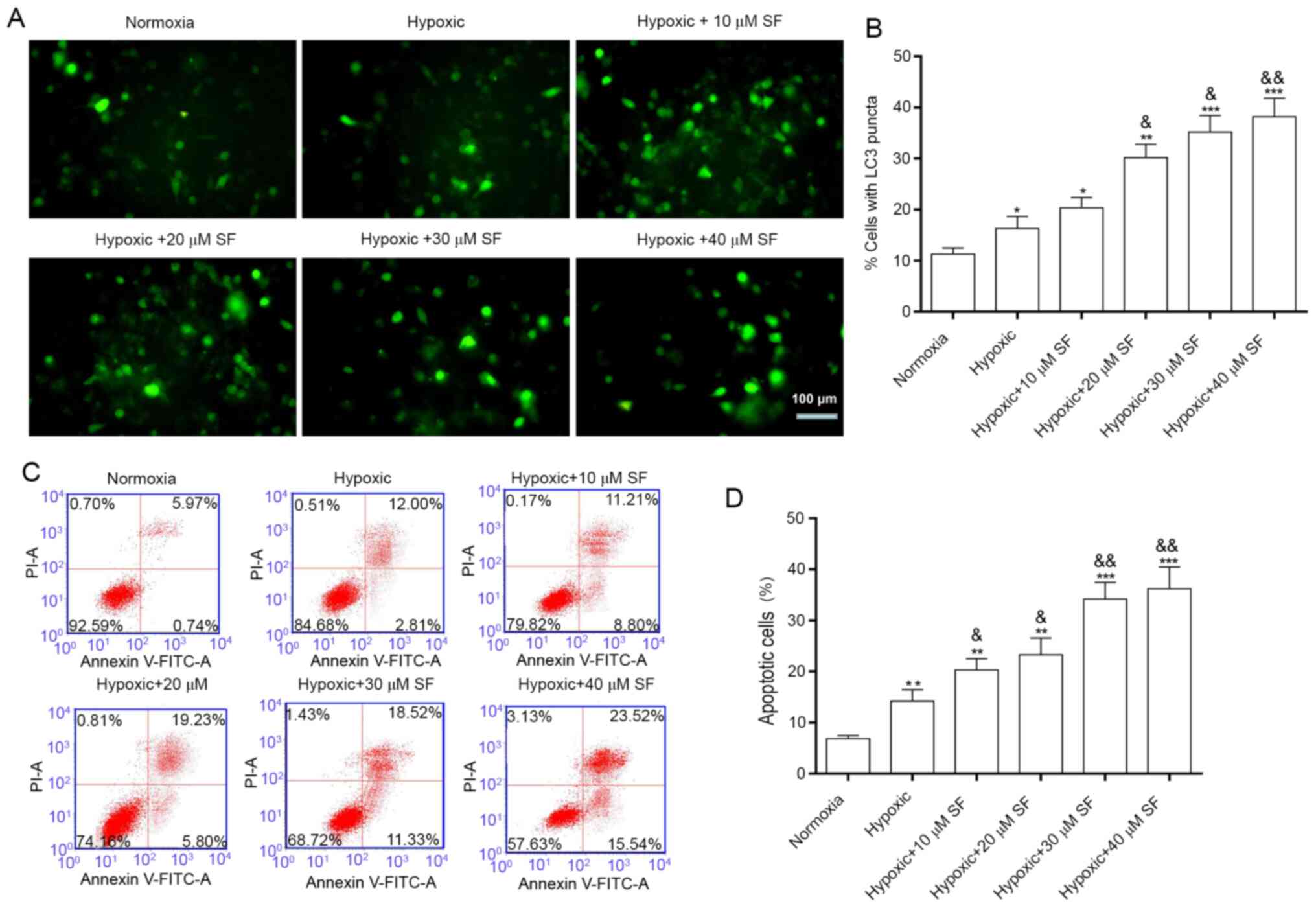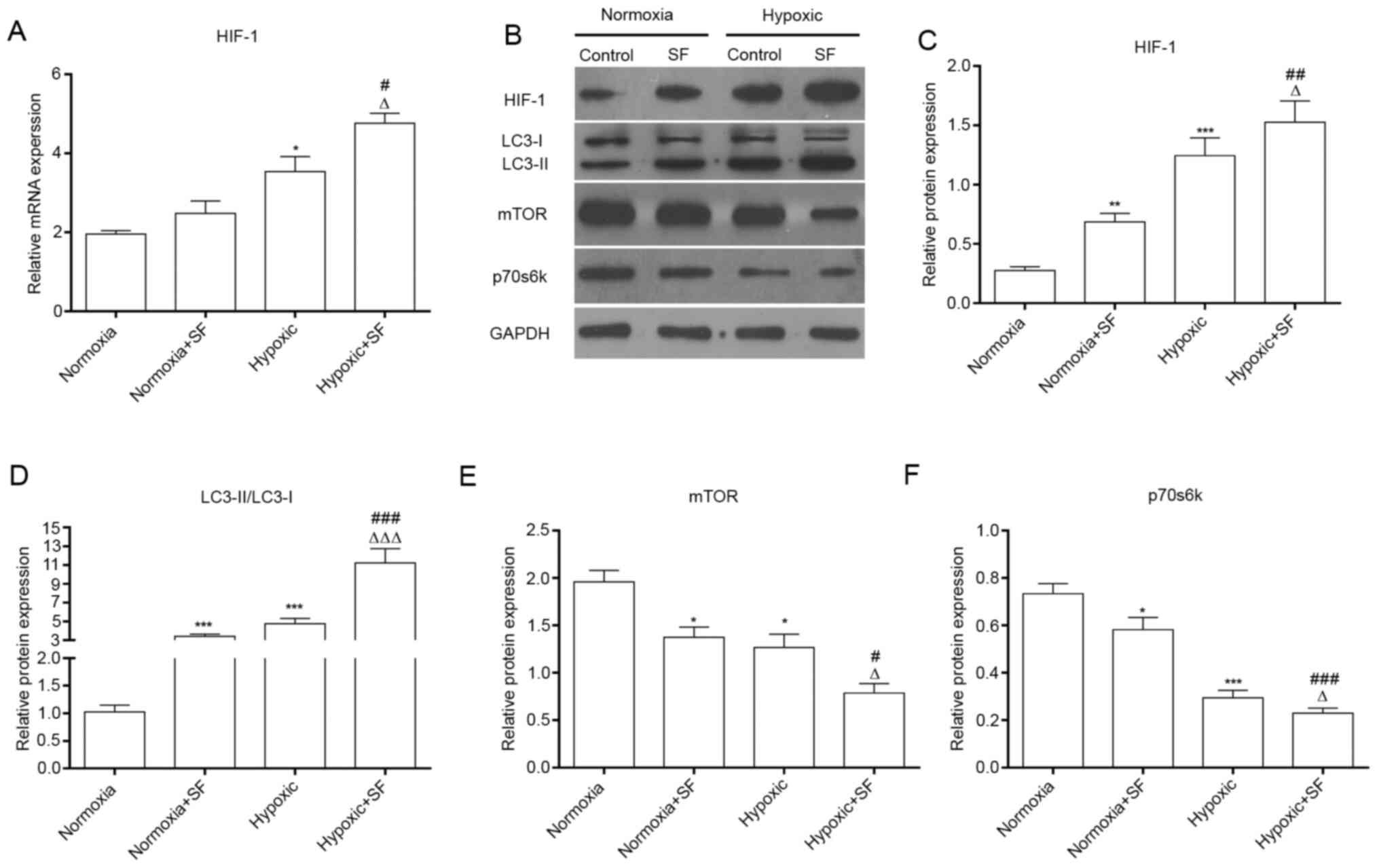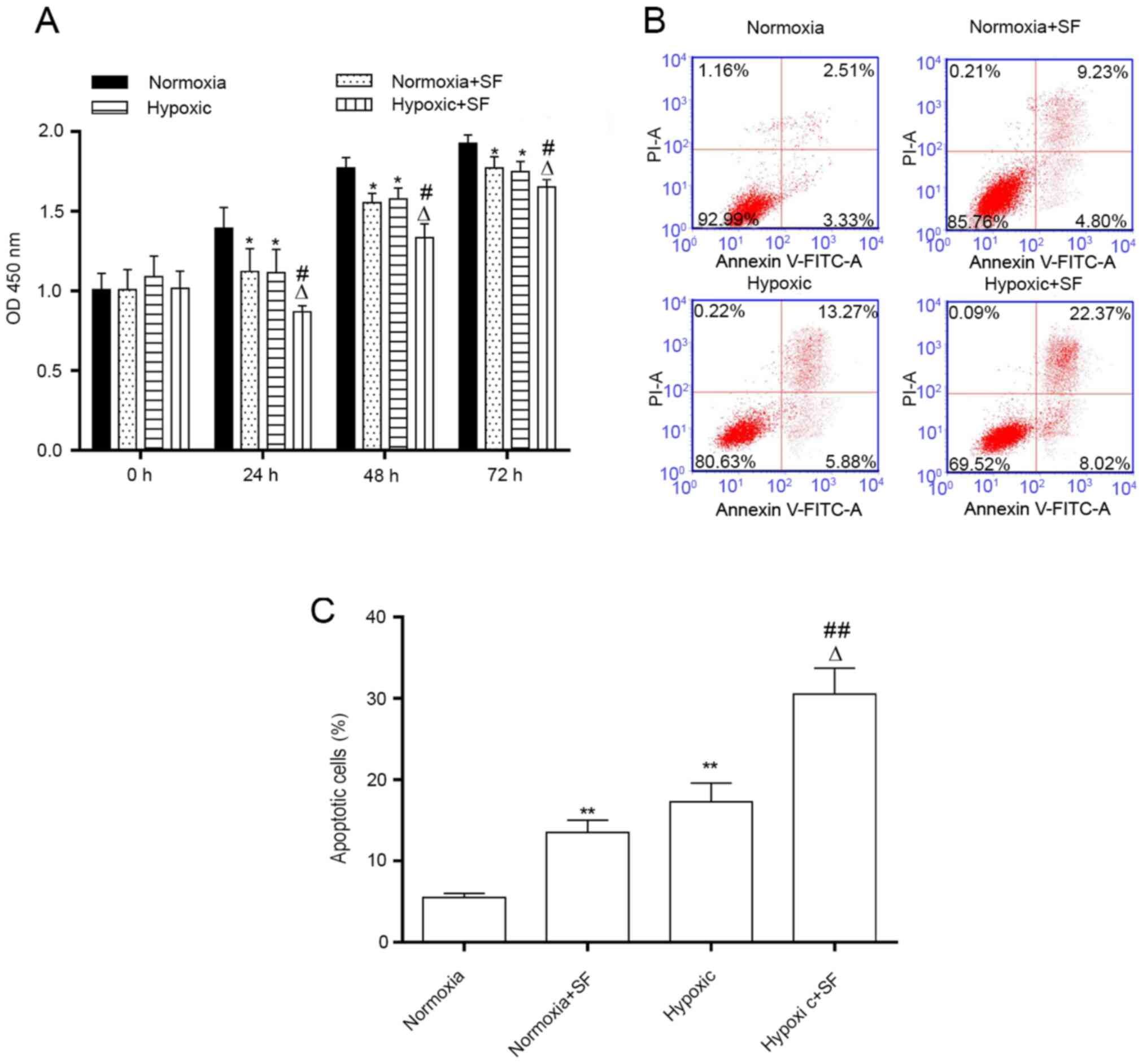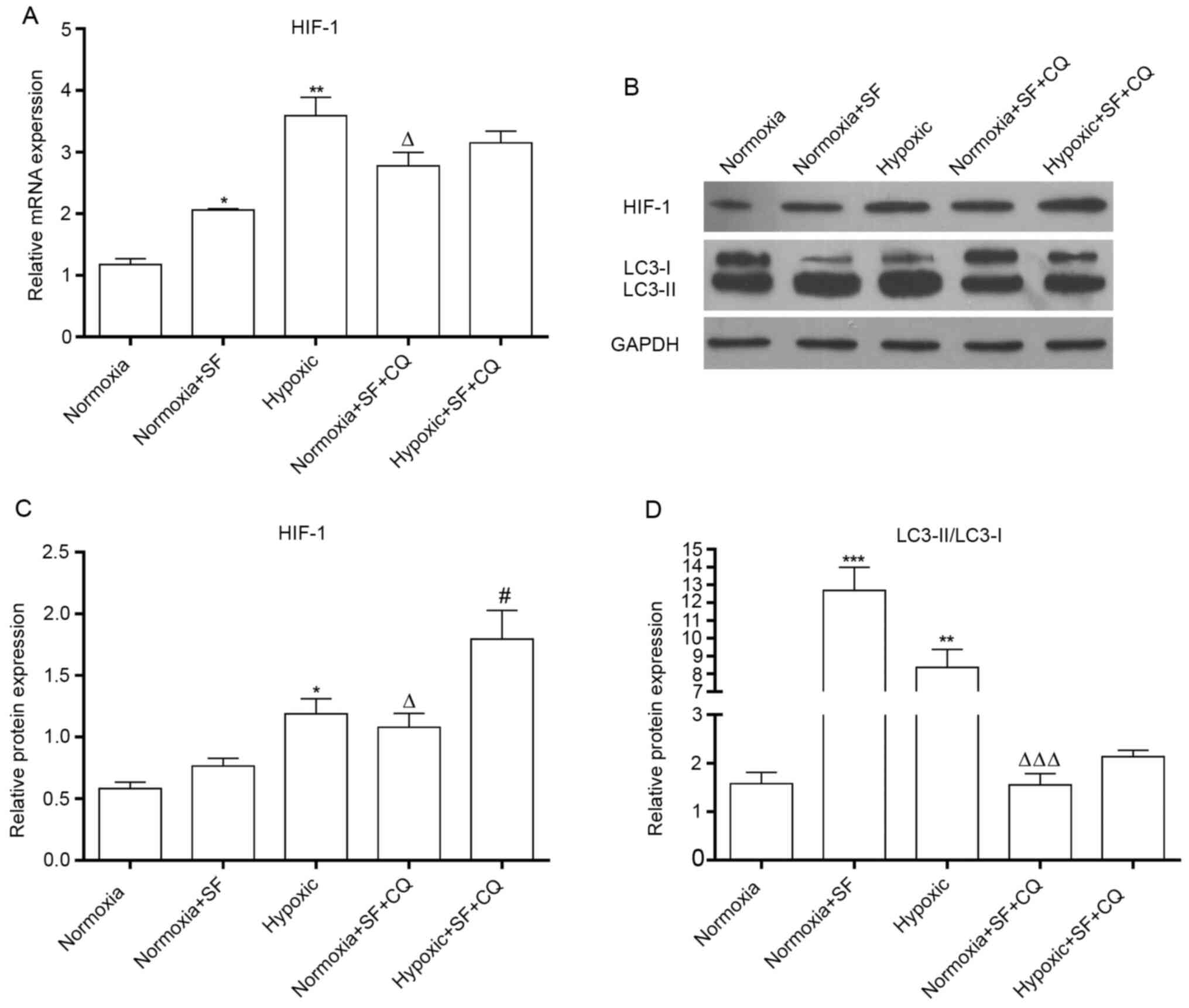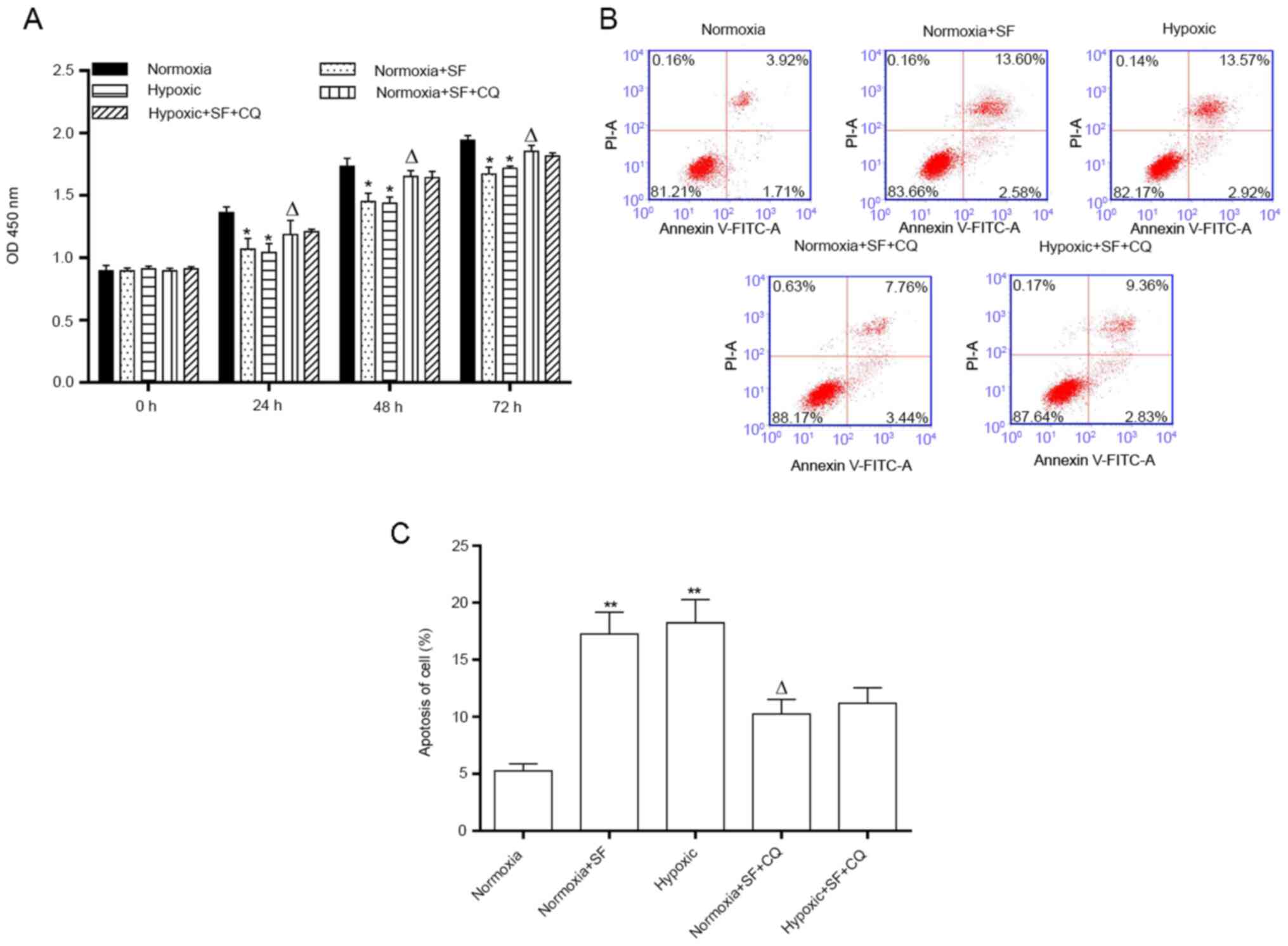|
1
|
Cong WM, Bu H, Chen J, Dong H, Zhu YY,
Feng LH, Chen J and Guideline Committee: Practice guidelines for
the pathological diagnosis of primary liver cancer: 2015 update.
World J Gastroenterol. 22:9279–9287. 2016.PubMed/NCBI View Article : Google Scholar
|
|
2
|
Yamashita T and Kaneko S: Liver cancer.
Rinsho Byori. 64:787–796. 2016.PubMed/NCBI(In Japanese).
|
|
3
|
Murray CJL, Vos T, Lozano R, Naghavi M,
Flaxman AD, Michaud C, Ezzati M, Shibuya K, Salomon JA, Abdalla S,
et al: Disability-adjusted life years (DALYs) for 291 diseases and
injuries in 21 regions, 1990-2010: A systematic analysis for the
Global Burden of Disease Study 2010. Lancet. 380:2197–2223.
2012.PubMed/NCBI View Article : Google Scholar
|
|
4
|
Zhu XD and Sun HC: Emerging agents and
regimens for hepatocellular carcinoma. J Hematol Oncol.
12(110)2019.PubMed/NCBI View Article : Google Scholar
|
|
5
|
Fattovich G, Stroffolini T, Zagni I and
Donato F: Hepatocellular carcinoma in cirrhosis: Incidence and risk
factors. Gastroenterology. 127 (Suppl 1):S35–S50. 2004.PubMed/NCBI View Article : Google Scholar
|
|
6
|
Grandhi MS, Kim AK, Ronnekleiv-Kelly SM,
Kamel IR, Ghasebeh MA and Pawlik TM: Hepatocellular carcinoma: From
diagnosis to treatment. Surg Oncol. 25:74–85. 2016.PubMed/NCBI View Article : Google Scholar
|
|
7
|
Keating GM: Sorafenib: A review in
hepatocellular carcinoma. Target Oncol. 12:243–253. 2017.PubMed/NCBI View Article : Google Scholar
|
|
8
|
Méndez-Blanco C, Fondevila F,
García-Palomo A, González-Gallego J and Mauriz JL: Sorafenib
resistance in hepatocarcinoma: Role of hypoxia-inducible factors.
Exp Mol Med. 50:1–9. 2018.PubMed/NCBI View Article : Google Scholar
|
|
9
|
Haga Y, Kanda T, Nakamura M, Nakamoto S,
Sasaki R, Takahashi K, Wu S and Yokosuka O: Overexpression of c-Jun
contributes to sorafenib resistance in human hepatoma cell lines.
PLoS One. 12(e0174153)2017.PubMed/NCBI View Article : Google Scholar
|
|
10
|
Gedaly R, Angulo P, Hundley J, Daily MF,
Chen C and Evers BM: PKI-587 and sorafenib targeting PI3K/AKT/mTOR
and Ras/Raf/MAPK pathways synergistically inhibit HCC cell
proliferation. J Surg Res. 176:542–548. 2012.PubMed/NCBI View Article : Google Scholar
|
|
11
|
Shimizu S, Takehara T, Hikita H, Kodama T,
Tsunematsu H, Miyagi T, Hosui A, Ishida H, Tatsumi T, Kanto T, et
al: Inhibition of autophagy potentiates the antitumor effect of the
multikinase inhibitor sorafenib in hepatocellular carcinoma. Int J
Cancer. 131:548–557. 2012.PubMed/NCBI View Article : Google Scholar
|
|
12
|
Zhang CZ, Wang XD, Wang HW, Cai Y and Chao
LQ: Sorafenib inhibits liver cancer growth by decreasing mTOR, AKT,
and PI3K expression. J BUON. 20:218–222. 2015.PubMed/NCBI
|
|
13
|
Ling S, Song L, Fan N, Feng T, Liu L, Yang
X, Wang M, Li Y, Tian Y, Zhao F, et al: Combination of metformin
and sorafenib suppresses proliferation and induces autophagy of
hepatocellular carcinoma via targeting the mTOR pathway. Int J
Oncol. 50:297–309. 2017.PubMed/NCBI View Article : Google Scholar
|
|
14
|
Tai WT, Shiau CW, Chen HL, Liu CY, Lin CS,
Cheng AL, Chen PJ and Chen KF: Mcl-1-dependent activation of Beclin
1 mediates autophagic cell death induced by sorafenib and SC-59 in
hepatocellular carcinoma cells. Cell Death Dis.
4(e485)2013.PubMed/NCBI View Article : Google Scholar
|
|
15
|
Llovet JM, Ricci S, Mazzaferro V, Hilgard
P, Gane E, Blanc JF, de Oliveira AC, Santoro A, Raoul JL, Forner A,
et al: SHARP Investigators Study Group: Sorafenib in advanced
hepatocellular carcinoma. N Engl J Med. 359:378–390.
2008.PubMed/NCBI View Article : Google Scholar
|
|
16
|
Cheng AL, Kang YK, Chen Z, Tsao CJ, Qin S,
Kim JS, Luo R, Feng J, Ye S, Yang TS, et al: Efficacy and safety of
sorafenib in patients in the Asia-Pacific region with advanced
hepatocellular carcinoma: A phase III randomised, double-blind,
placebo-controlled trial. Lancet Oncol. 10:25–34. 2009.PubMed/NCBI View Article : Google Scholar
|
|
17
|
Xiong XX, Qiu XY, Hu DX and Chen XQ:
Advances in hypoxia-mediated mechanisms in hepatocellular
carcinoma. Mol Pharmacol. 92:246–255. 2017.PubMed/NCBI View Article : Google Scholar
|
|
18
|
Guo Y, Xiao Z, Yang L, Gao Y, Zhu Q, Hu L,
Huang D and Xu Q: Hypoxia-inducible factors in hepatocellular
carcinoma (Review). Oncol Rep. 43:3–15. 2020.PubMed/NCBI View Article : Google Scholar
|
|
19
|
Vaupel P and Mayer A: Hypoxia in cancer:
Significance and impact on clinical outcome. Cancer Metastasis Rev.
26:225–239. 2007.PubMed/NCBI View Article : Google Scholar
|
|
20
|
Walsh JC, Lebedev A, Aten E, Madsen K,
Marciano L and Kolb HC: The clinical importance of assessing tumor
hypoxia: Relationship of tumor hypoxia to prognosis and therapeutic
opportunities. Antioxid Redox Signal. 21:1516–1554. 2014.PubMed/NCBI View Article : Google Scholar
|
|
21
|
Koch CJ and Evans SM: Optimizing hypoxia
detection and treatment strategies. Semin Nucl Med. 45:163–176.
2015.PubMed/NCBI View Article : Google Scholar
|
|
22
|
Höckel M and Vaupel P: Tumor hypoxia:
Definitions and current clinical, biologic, and molecular aspects.
J Natl Cancer Inst. 93:266–276. 2001.PubMed/NCBI View Article : Google Scholar
|
|
23
|
Rana NK, Singh P and Koch B: CoCl2
simulated hypoxia induce cell proliferation and alter the
expression pattern of hypoxia associated genes involved in
angiogenesis and apoptosis. Biol Res. 52(12)2019.PubMed/NCBI View Article : Google Scholar
|
|
24
|
Allen CB, Schneider BK and White CW:
Limitations to oxygen diffusion and equilibration in in vitro cell
exposure systems in hyperoxia and hypoxia. Am J Physiol Lung Cell
Mol Physiol. 281:L1021–L1027. 2001.PubMed/NCBI View Article : Google Scholar
|
|
25
|
Chiu DK, Tse AP, Xu IM, Di Cui J, Lai RK,
Li LL, Koh HY, Tsang FH, Wei LL, Wong CM, et al: Hypoxia inducible
factor HIF-1 promotes myeloid-derived suppressor cells accumulation
through ENTPD2/CD39L1 in hepatocellular carcinoma. Nat Commun.
8(517)2017.PubMed/NCBI View Article : Google Scholar
|
|
26
|
Kahraman DS, Diniz G, Sayhan S, Ayaz D,
Yemen M, Karadeniz T and Sanci M: The clinicopathologic
significance of hypoxia inducible factor 1 alpha expression in
ovarian serous tumors. Eur J Gynaecol Oncol. 40:242–245. 2019.
|
|
27
|
Lin C-A, Chang L-L, Zhu H, He Q-J and Yang
B: Hypoxic microenvironment and hepatocellular carcinoma treatment.
Hepatoma Res. 4(26)2018.
|
|
28
|
Wilson GK, Tennant DA and McKeating JA:
Hypoxia inducible factors in liver disease and hepatocellular
carcinoma: Current understanding and future directions. J Hepatol.
61:1397–1406. 2014.PubMed/NCBI View Article : Google Scholar
|
|
29
|
Fang Y, Tan J and Zhang Q: Signaling
pathways and mechanisms of hypoxia-induced autophagy in the animal
cells. Cell Biol Int. 39:891–898. 2015.PubMed/NCBI View Article : Google Scholar
|
|
30
|
Li YJ, Lei YH, Yao N, Wang CR, Hu N, Ye
WC, Zhang DM and Chen ZS: Autophagy and multidrug resistance in
cancer. Chin J Cancer. 36(52)2017.PubMed/NCBI View Article : Google Scholar
|
|
31
|
Onorati AV, Dyczynski M, Ojha R and
Amaravadi RK: Targeting autophagy in cancer. Cancer. 124:3307–3318.
2018.PubMed/NCBI View Article : Google Scholar
|
|
32
|
Levy JMM, Towers CG and Thorburn A:
Targeting autophagy in cancer. Nat Rev Cancer. 17:528–542.
2017.PubMed/NCBI View Article : Google Scholar
|
|
33
|
White E: Autophagy and p53. Cold Spring
Harb Perspect Med. 6(a026120)2016.PubMed/NCBI View Article : Google Scholar
|
|
34
|
Zhang J, Zhang JX and Zhang QL:
PI3K/AKT/mTOR-mediated autophagy in the development of autism
spectrum disorder. Brain Res Bull. 125:152–158. 2016.PubMed/NCBI View Article : Google Scholar
|
|
35
|
Kinsey CG, Camolotto SA, Boespflug AM,
Guillen KP, Foth M, Truong A, Schuman SS, Shea JE, Seipp MT, Yap
JT, et al: Protective autophagy elicited by RAF→MEK→ERK inhibition
suggests a treatment strategy for RAS-driven cancers. Nat Med.
25:620–627. 2019.PubMed/NCBI View Article : Google Scholar
|
|
36
|
Zhang X, Cheng Q, Yin H and Yang G:
Regulation of autophagy and EMT by the interplay between p53 and
RAS during cancer progression (Review). Int J Oncol. 51:18–24.
2017.PubMed/NCBI View Article : Google Scholar
|
|
37
|
Wu Q, Wu W, Fu B, Shi L, Wang X and Kuca
K: JNK signaling in cancer cell survival. Med Res Rev.
39:2082–2104. 2019.PubMed/NCBI View Article : Google Scholar
|
|
38
|
Mauthe M, Orhon I, Rocchi C, Zhou X, Luhr
M, Hijlkema KJ, Coppes RP, Engedal N, Mari M and Reggiori F:
Chloroquine inhibits autophagic flux by decreasing
autophagosome-lysosome fusion. Autophagy. 14:1435–1455.
2018.PubMed/NCBI View Article : Google Scholar
|
|
39
|
Yang S, Qiang L, Sample A, Shah P and He
Y-Y: NF-κB signaling activation induced by chloroquine requires
autophagosome, p62 protein, and c-Jun N-terminal kinase (JNK)
signaling and promotes tumor cell resistance. J Biol Chem.
292:3379–3388. 2017.PubMed/NCBI View Article : Google Scholar
|
|
40
|
Edelstein CL, Venkatachalam MA and Dong Z:
Autophagy inhibition by chloroquine and hydroxychloroquine could
adversely affect acute kidney injury and other organ injury in
critically ill patients with COVID-19. Kidney Int. 98:234–235.
2020.PubMed/NCBI View Article : Google Scholar
|
|
41
|
Weiskirchen R and Tacke F: Relevance of
autophagy in parenchymal and non-parenchymal liver cells for health
and disease. Cells. 8(8)2019.PubMed/NCBI View Article : Google Scholar
|
|
42
|
Bravo-San Pedro JM, Pietrocola F, Sica V,
Izzo V, Sauvat A, Kepp O, Maiuri MC, Kroemer G and Galluzzi L:
High-throughput quantification of GFP-LC3+ dots by
automated fluorescence microscopy. Methods Enzymol. 587:71–86.
2017.PubMed/NCBI View Article : Google Scholar
|
|
43
|
Livak KJ and Schmittgen TD: Analysis of
relative gene expression data using real-time quantitative PCR and
the 2(-Delta Delta C(T)) Method. Methods. 25:402–408.
2001.PubMed/NCBI View Article : Google Scholar
|
|
44
|
Runwal G, Stamatakou E, Siddiqi FH, Puri
C, Zhu Y and Rubinsztein DC: LC3-positive structures are prominent
in autophagy-deficient cells. Sci Rep. 9(10147)2019.PubMed/NCBI View Article : Google Scholar
|
|
45
|
Lee YK and Lee JA: Role of the mammalian
ATG8/LC3 family in autophagy: Differential and compensatory roles
in the spatiotemporal regulation of autophagy. BMB Rep. 49:424–430.
2016.PubMed/NCBI View Article : Google Scholar
|
|
46
|
Sasaki R, Kanda T, Fujisawa M, Matsumoto
N, Masuzaki R, Ogawa M, Matsuoka S, Kuroda K and Moriyama M:
Different mechanisms of action of regorafenib and lenvatinib on
Toll-like receptor-signaling pathways in human hepatoma cell lines.
Int J Mol Sci. 21(3349)2020.PubMed/NCBI View Article : Google Scholar
|
|
47
|
Dai N, Ye R, He Q, Guo P, Chen H and Zhang
Q: Capsaicin and sorafenib combination treatment exerts synergistic
anti- hepatocellular carcinoma activity by suppressing EGFR and
PI3K/Akt/mTOR signaling. Oncol Rep. 40:3235–3248. 2018.PubMed/NCBI View Article : Google Scholar
|
|
48
|
Bareford MD, Hamed HA, Tang Y,
Cruickshanks N, Burow ME, Fisher PB, Moran RG, Nephew KP, Grant S
and Dent P: Sorafenib enhances pemetrexed cytotoxicity through an
autophagy-dependent mechanism in cancer cells. Autophagy.
7:1261–1262. 2011.PubMed/NCBI View Article : Google Scholar
|
|
49
|
Rong LW, Wang RX, Zheng XL, Feng XQ, Zhang
L, Zhang L, Lin Y, Li ZP and Wang X: Combination of wogonin and
sorafenib effectively kills human hepatocellular carcinoma cells
through apoptosis potentiation and autophagy inhibition. Oncol
Lett. 13:5028–5034. 2017.PubMed/NCBI View Article : Google Scholar
|
|
50
|
Shi YH, Ding ZB, Zhou J, Hui B, Shi GM, Ke
AW, Wang XY, Dai Z, Peng YF, Gu CY, et al: Targeting autophagy
enhances sorafenib lethality for hepatocellular carcinoma via ER
stress-related apoptosis. Autophagy. 7:1159–1172. 2011.PubMed/NCBI View Article : Google Scholar
|
|
51
|
Heras-Sandoval D, Pérez-Rojas JM,
Hernández-Damián J and Pedraza-Chaverri J: The role of
PI3K/AKT/mTOR pathway in the modulation of autophagy and the
clearance of protein aggregates in neurodegeneration. Cell Signal.
26:2694–2701. 2014.PubMed/NCBI View Article : Google Scholar
|
|
52
|
Kim YC and Guan KL: mTOR: A pharmacologic
target for autophagy regulation. J Clin Invest. 125:25–32.
2015.PubMed/NCBI View Article : Google Scholar
|
|
53
|
Fritzen AM, Frøsig C, Jeppesen J, Jensen
TE, Lundsgaard AM, Serup AK, Schjerling P, Proud CG, Richter EA and
Kiens B: Role of AMPK in regulation of LC3 lipidation as a marker
of autophagy in skeletal muscle. Cell Signal. 28:663–674.
2016.PubMed/NCBI View Article : Google Scholar
|
|
54
|
Sun J, Mu Y, Jiang Y, Song R, Yi J, Zhou
J, Sun J, Jiao X, Prinz RA, Li Y, et al: Inhibition of p70 S6
kinase activity by A77 1726 induces autophagy and enhances the
degradation of superoxide dismutase 1 (SOD1) protein aggregates.
Cell Death Dis. 9(407)2018.PubMed/NCBI View Article : Google Scholar
|
|
55
|
Gedaly R, Angulo P, Hundley J, Daily MF,
Chen C, Koch A and Evers BM: PI-103 and sorafenib inhibit
hepatocellular carcinoma cell proliferation by blocking
Ras/Raf/MAPK and PI3K/AKT/mTOR pathways. Anticancer Res.
30:4951–4958. 2010.PubMed/NCBI
|















